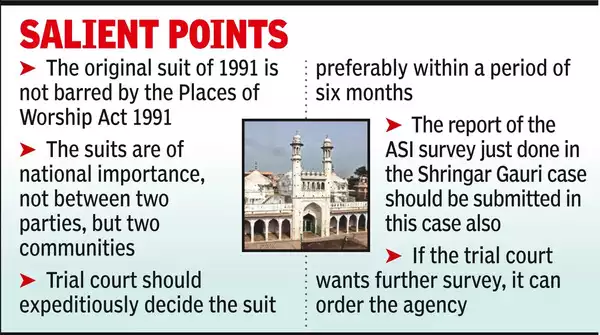Gyanvapi Mosque Committee Opposes Challenges to 1991 Act
Why in the news?
Gyanvapi mosque management opposes petitions against the Places of Worship Act, 1991, arguing invalidating the law could escalate religious disputes and conflicts across India.
Gyanvapi Mosque Committee’s Argument:
- The Gyanvapi mosque management has opposed petitions challenging the Places of Worship (Special Provisions) Act of 1991 in the Supreme Court.
- The committee argued that rhetorical claims based on actions of Mughal rulers against Hindu places of worship cannot be grounds for challenging the constitutionality of the law.
- Referring to the Ayodhya judgment, the mosque management emphasized that the Supreme Court cannot entertain claims stemming from the actions of past rulers, such as those related to the perceived destruction of Hindu temples.
Significance of the Places of Worship Act, 1991:
- The Act, enacted by Parliament, prohibits altering the religious character of any place of worship as it existed on August 15, 1947.
- The Gyanvapi mosque management stressed that the law was a conscious decision to prevent historical grievances from disrupting the future.
- They emphasized that the Act preserves the character of religious sites across all faiths, ensuring peace and stability.
Potential Consequences of Invalidating the Act:
- The mosque committee warned that invalidating the law could lead to a rise in disputes similar to the recent violence in Sambhal following a Jama Masjid survey.
- They urged that challenges to the law should be based on the unconstitutionality of its provisions, not historical grievances.
- The committee emphasized that overturning the 1991 Act could escalate religious conflicts, potentially leading to nationwide unrest.
About the Places of Worship Act, 1991:
- Purpose: Prohibits conversion of any place of worship and preserves the religious character as it existed on August 15, 1947.
- Context: Enacted after the Babri Masjid demolition in 1992 to promote communal harmony.
Key Provisions:
- Bars conversion of places of worship (temples, mosques, churches, etc.).
- Religious character as of August 15, 1947 remains unchanged.
- Abates pending legal cases regarding worship place conversions.
- Exempts ancient monuments, resolved disputes, and Ayodhya site.
- Penalties include up to three years imprisonment and a fine.
Sources Referred:
PIB, The Hindu, Indian Express, Hindustan Times




